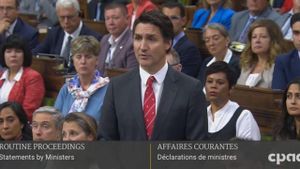Labour's Autumn Budget 2024, presented by Chancellor Rachel Reeves, has ignited significant conversations and debates throughout the UK as it proposes $40 billion worth of tax hikes aimed at boosting public services, particularly the NHS. This marks Labour's first budget since coming to power and sets the stage for what many anticipate will be politically pivotal moves for the party.
Coming fresh off election victories, the Labour Party's proposed fiscal strategies come at a time when many public services are seen as crumbling under pressure. A recent poll by Arden Strategies highlighted the public sentiment, indicating two-thirds (63%) of Brits understand the necessity of some tax increases to address deteriorated infrastructure and social services. Nearly half (47%) also believe Reeves' budget will yield positive results for the NHS and other public institutions.
Despite the clear intentions behind the tax increases, the budget has faced backlash from various sectors. Health leaders warn about the potential fallout from hikes to employers' National Insurance contributions, arguing it could lead to the closure of GP practices and care homes throughout the country. Professor Kamila Hawthorne, chairwoman of the Royal College of GPs, has warned the added financial burden might burden many practices to the point of closure. "For some, this extra financial burden will be the straw that'll break the camel's back, forcing them to make tough decisions on redundancies or even closing their practice," she said.
Another major component of the budget is the substantial injection of $22 billion earmarked for the NHS, which the government touts as necessary to revamp the crumbling healthcare system. Labour officials claim the funding, alongside rising National Insurance, will help stabilize the NHS and improve care services, but many critics argue it will do little to resolve the looming shortage of resources and personnel.
Criticism also came from former Conservative chancellor Jeremy Hunt, who criticized the budget for driving down living standards and increasing costs for the average worker. He stated, "We are going to have lower living standards, we are going to have higher prices, fewer jobs, and more expensive mortgages. Life is going to get tougher for ordinary people." Official forecaster the Office for Budget Responsibility (OBR) predicts mortgage rates are likely to rise due to the budget’s tax measures, leading many homeowners to worry about their financial futures.
On the brighter side, surveys indicate many voters appear to back Labour's intentions to invest heavily in public services, seeing it as necessary after years of austerity measures. The budget's introduction of fairer taxation, including ending non-domicile (non-dom) status and implementing VAT on private school fees, received favorable feedback, particularly among progressive groups and those who prioritize public service funding.
Despite the general positive reception, the Labour Party must navigate the nuanced sentiments of the public, with approximately 40% of respondents expressing negativity toward the budget. Concerns of growing dissatisfaction could pose issues for Labour as they pursue their long-term objectives. Reeves and her team are gearing up for the upcoming challenges, with many acknowledging the need to strike the right balance between investment and managing public expectations.
Chancellor Reeves firmly believes this budget marks the dawn of constructive policies aimed at recalibring the UK's socio-economic challenges. She stated during her budget reveal, "More teachers, more appointments, more homes – the investment we need to rebuild our country." Critics, on the other hand, are questioning the sustainability of these commitments, noting concerns over the potential for higher borrowing costs due to increased debt interest payments, which may necessitate even more rises in taxation down the road.
Further complicity arises from the government’s dynamic with private sector partners. Increased taxes, coupled with higher minimum wages, have raised worries particularly among small businesses. Crispin Odey, CEO of Odey Asset Management, commented on the potential market instability, saying, "The markets are jittery and the government’s fiscal strategy must firmly position the country to avoid unnecessary turmoil."
Labour’s leadership has publicly expressed their resolve to maintain fiscal responsibility, with Reeves emphasizing the need for economic stability. She assured critics on Channel 4, "We have put our public finances on firm footing with our fiscal rules. We won't come back to raise taxes again.”
Meanwhile, there are manifold reactions from various sectors, including social care providers expressing fears of insolvency amid the increased tax burden. They predict potential job cuts and service reductions, echoing sentiments of GPs facing their own operational hurdles. Although the government promises to bolster support for struggling services, tangible changes will likely be needed sooner than later to mitigate the financial strains imposed by the new tax structures.
Examining the political climate, Labour known for its focus on working-class issues is now caught between its traditional values and the contemporary economic realities facing the UK. Observers within Parliament remark on the importance of maintaining engagement with voters to counteract doubts brought forth by the budget. "We’ve made our choices, now it is time to sell them," said one Labour official, indicating the necessity for effective communication and solid outreach programs moving forward.
Labour's strategy is particularly interesting now, as they aim to bolster their standing against the Conservative Party as they face growing scrutiny about governmental approaches to public spending. The timing is pivotal, leading many to speculate how Reeves will reconcile the conflicting expectations from voters, businesses, and health leaders.
With new tax measures and significant spending promises, Labour is attempting to map out its vision for the next few years, venturing for public trust whilst simultaneously wrestling with economic realities. Whether these tactics will yield the anticipated positive outcomes remains to be seen as experts, voters, and political opponents closely follow the impact of these sweeping fiscal changes.
Overall, the 2024 Autumn Budget presents Labour with both opportunities and challenges. The approach it takes may very well reshape the narrative of its economic policy and influence public perception of its commitment to serving the citizens' needs effectively.



